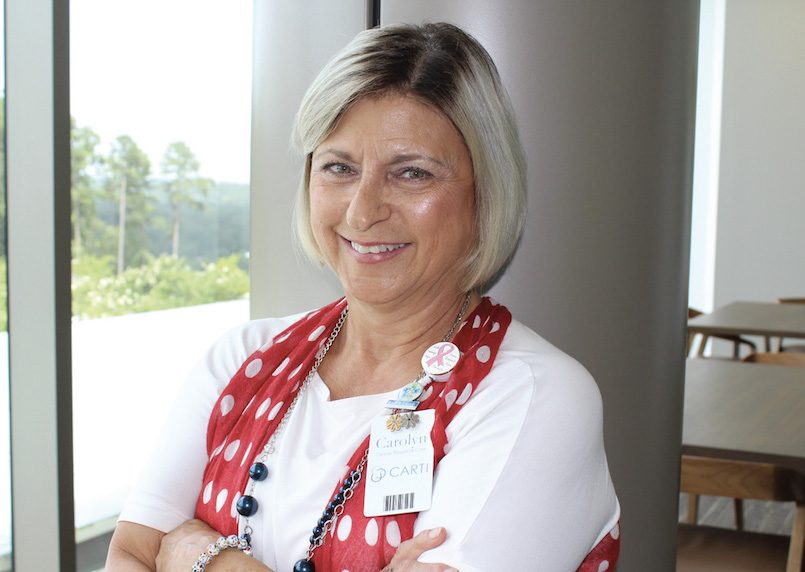24 Sep 2018 Survivors: It takes one to know one
Story and photo
by Dwain Hebda
Carolyn Garrett sits with a woman at a long conference table. It’s hard to tell the woman’s age because the chemo has taken her hair and given her skin a pallor, but one look and you know the woman is tired. Tired of appointments, tired of medications, tired of carrying cancer around like a 50-pound rucksack wherever she goes.
She’s not a very big person, Garrett, but her smile lights up the room like sunlight on a mirror. She spends as much time as the patient needs, talking, nodding. As the woman shuffles to the elevator, she takes a little of Garrett’s spark with her.
“A cancer resource coordinator actually sits in this room and talks to patients all day long,” said Garrett of her job at CARTI in Little Rock. “We have all our literature here; we have all our programs here. I talk with our patients about massage therapy, retreats, yoga. If they’re looking for diet information, recipes, I have that. If they’re looking for wigs, or possibly a hat or scarves, we have that next door.”

Garrett knows how important these small comforts are. Not long ago she was in the very same boat as the people she sees on a daily basis, battling breast cancer and worrying what the future held for herself, her husband and her two daughters.
“They did the mammogram in 1996, and they called me the very next day,” Garrett said. “They said, ‘Miss Garrett, we need to do another one, and we need to do an ultrasound.’ I said, ‘OK. What are we looking at?’ They said, ‘Well, we found a solid tumor, but we’ve got to check it out.’”
The tests revealed cancer, and before long, she’d had a partial mastectomy, underwent six weeks of radiation and a mammogram every three months afterward. Six years later, in 2002, she was approaching a milestone of consecutive clear tests, after which time the frequency would back down to annual mammograms.
“September of ’02, I went in, had a reoccurrence,” she said with a wouldn’t-you-know-it wag of her head. This time she had a bilateral mastectomy, but that wasn’t all that had changed. In 2000, she’d come on board at CARTI full-time and was spending every working day talking to patients in ways only a fellow fighter could.
“I’ll tell you, cancer changes you and not necessarily for the bad,” she said. “It just changes the way you look at things, the way you do things. Things that used to be a priority, no more are a priority. It just changes you whether you want it to or not.
“I can’t explain it, but I can kind of tell when someone walks through this door if they need me to get up and give them a hug, tell them my story. Or, if they need me to just shut up and listen to them. I mean there’s just something there that I can kind of tell.”
Most of the people Garrett sees are just starting their treatment, and for many, the shock of being diagnosed is still fresh and raw.
“I had one patient in Conway, female, she had lung cancer,” she said. “She and her husband come in, sit down at my desk and I was doing her registration. She wouldn’t look at me. She wouldn’t speak to me. He was answering all of her questions.
“If I said something that I wanted her to answer, she’d just kind of look at me and give me that look: Go wherever you want to, but don’t talk to me. She was mad at the world, and he was trying to cover up and be nice and everything.”
Later, as the woman was about to be seen by the doctor, she asked Garrett to show her where the restroom was.
“I’m going to show her where the restroom is, she looks at me eye-to-eye contact, reaches out, grabs me and she says, ‘I’m sorry I’m a bitch,’” Garrett recalls. “And I said, ‘You don’t owe me an apology. I’ve been there. I’ve done that.’ I told her a real brief story how I was a two-time breast cancer survivor. To this day we are very good friends.”
Garrett, 63, preaches early detection for those women who haven’t been diagnosed and a strong support system for those who have. She’s seen women as young as 19 and as old as 94, and she loves on all of them as if they were her own family. Just being alive is all that matters, she tells them — the rest they can face together.
“I see a lot of females here, and more females are upset about losing their hair than they are about losing their breasts,” she said. “I think it’s because that’s our identity and that’s what people see of us. We can mask (breasts); we can put a big shirt on, we can get false ones, whatever. But this right here, our hair? Everybody sees that. So, I tell them it’s only hair. It will grow back. And I hug them, and I cry with them.”
- The pinnacle of success - June 1, 2025
- Five-Oh-Ones to Watch 2025: Aaron Farris - December 31, 2024
- Julia Gaffney brings medals and mettle home to Mayflower - October 30, 2024










